[Bianculli here: Contributing writer Tom Brinkmoeller looks at the next two American Experience presentations on PBS, and finds their Depression-era topics clearly pertinent to today...]
Two 'American Experience' Hours Show That 'Past as Prologue' Applies in Many a Tempest
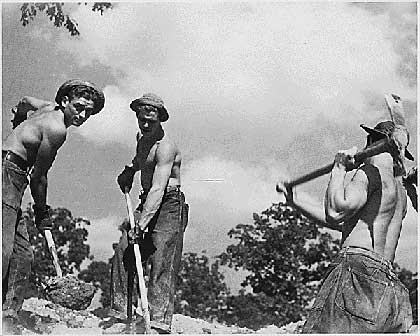 Looking for some perspective in a time when oil is spilling, out of control, into the Gulf of Mexico? When the stock market inexplicably dropped nearly a thousand points in an hour? When the Euro's distress is infecting the world's already-ailing economy? When Arizona ignited a divided America with an immigration law that seems to hinge on profiling?
Looking for some perspective in a time when oil is spilling, out of control, into the Gulf of Mexico? When the stock market inexplicably dropped nearly a thousand points in an hour? When the Euro's distress is infecting the world's already-ailing economy? When Arizona ignited a divided America with an immigration law that seems to hinge on profiling?
If so, a couple of PBS American Experience reruns over the next two weeks do a good job of holding history up to the present and removing thoughts that what's happening now is a singular experience. The series reprises two episodes that document aspects of the Great Depression, and in watching one or both, a viewer probably will conclude that the country has recovered from much worse conditions -- though not without a lot of hard work and heartaches.
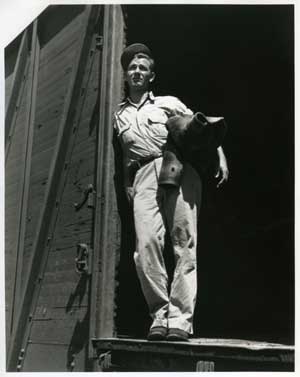
Riding the Rails (May 24, 9-10 p.m. ET, PBS -- check local listings) is a fascinating history of the estimated 4 million people who left or were forced from their homes between 1929 and 1941. They lived on the roads and rails, either by hitchhiking or by hopping freight trains, searching for a solution to the historic hard times of the Depression.
Civilian Conservation Corps (May 31, 9-10 p.m. ET, PBS -- check local listings) outlines the effects of a controversial and revolutionary program President Franklin Roosevelt initiated just months after he first took office in 1933.
Riding the Rails was produced in 1997, in a relatively calm and prosperous pre-9/11 era when financial backing was more easily found, and shows more polish and does a better job of uniting visuals to the story it tells.
The Civilian Conservation Corps hour first aired late last year on PBS and reflects the more restricted financial milieu in which it was born. Even so, they build on each other and watching both won't be duplicative nor disappointing,
The story of the first of the two is told by people who, as young men and women, took off to look for a way out of problems that only people who lived through the Great Depression can fully understand.
It was a time when there wasn't a national awareness of what was happening, and word of mouth and rumor often were the only influencers available when choosing a course. So many of these hoboes, as they were called, headed to California, often based on false rumors.
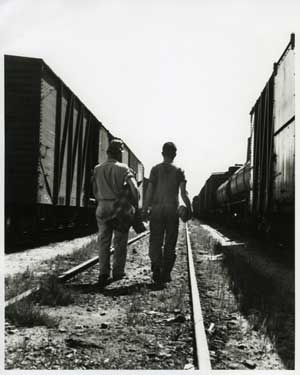
At one point, police were stationed at the border, and any hobo attempting to get in was escorted back to the Arizona line and told to stay out. A Texas town was so wary of the need to care for sick and indigent migrants that the town police drove them several miles beyond the city limits and left them alongside the road and the surrounding desert.
Many went to New York, following rumors, hoping to find a job on a ship. There were no jobs, and the city overflowed with even more people who tried to live on the street and survive. Others, charting a course many migrant workers still follow, became "fruit tramps," hoping to find jobs during seasonal harvests.
One of the veterans of the hobo life, interviewed for the show, remembers thinking, "Why does it have to be this way when the goddamn guys on Wall Street all have a million dollars?" He said that in the late '90s, and it's a question asked often during the current recession -- most recently and repeatedly following the Goldman Sachs controversy.
The hour ends with the 1933 creation of the Civilian Conservation Corps, and the relief it finally offered so many hopelessly poor and desperate people.
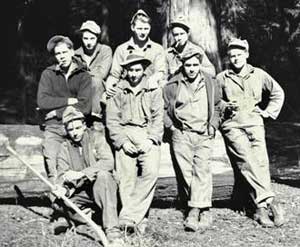
The Civilian Conservation Corps hour the following week excellently fleshes out that closing point. Soil conservation and environmentalism were virtual unknowns in the early part of the 20th century. It was the time of the dust bowl. The hour opens with a man remembering how he looked up to the sky above his North Carolina home to "watch Kansas blow by."
Four years after the crash of the stock market, official unemployment for the U.S. was 25 percent, though the uncounted unemployed probably pushed that number much higher, the program notes. The newly elected President Roosevelt aimed for work versus relief as a solution. Despite the strong opposition of business, labor unions and citizens who feared creeping socialism, the president had the program up and running in three months.
Three months.
Men enlisted, and were sent to camps that eventually were in every state. They earned a dollar a day (the cause of the unions' concerns), and a requirement was they send $25 of their monthly $30 paycheck back home.
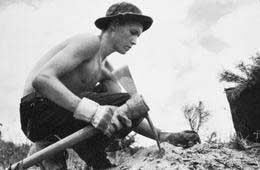
The CCCers reclaimed and replanted lands that had been ravished by poor agricultural practices and out-of-control lumbering. They planted 2.3 billion trees, blazed trails that hikers still use today, and helped build hundreds of state parks. People who did the work tell how hard it was, but how good it was to have food, clothing, a place to sleep and money to send home.
They also talk about the discrimination against African-American and Mexican-American members of the corps, both from within and from the communities located near the CCC camps. But in a time when discrimination largely was unchallenged in America, facing poverty and beating it erased many prejudices. They came to the camps from all parts of the country. Some were educated, some couldn't read or write. Some never had known wealth, while others had lost it.
"The only thing they had in common was that they were poor and in need of a job," a man interviewed for the show points out. Men undoubtedly returned from an enlistment in the CCC with viewpoints that were altered from the way they entered.
The start of World War II in December 1941 led to the end of the CCC. It was disbanded by July 1942. The lack of a standing army of sufficient size made it impractical to continue. Instead, many of they men who had gained experience in the paramilitary surroundings of the Civilian Conservation Corps made the transition to military life easily and quickly, giving the country already-seasoned personnel when the buildup otherwise might have been slowed and less efficient.
It's not consoling to watch the overwhelming problems those who proceeded us had to deal with. What's encouraging is how these members of the Greatest Generation beat those problems.